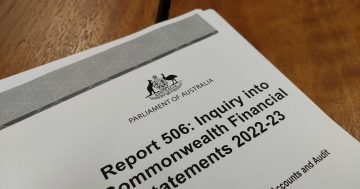
Improvements are needed in the administration of how parliamentarians use and claim expenses, the ANAO says. Photo: Michelle Kroll.
The Finance Department’s administration of the system overseeing how federal parliamentarians and their staff use and claim expenses has only been partly effective, according to the latest audit.
While the department established appropriate project governance arrangements, initial planning did not clearly define the scope and user requirements.
This failure led to a significant increase in costs and multiple delays in its rollout and use.
A review of the Parliamentary Expenses Management System (PEMS), the IT system used by MPs, senators and staff to claim office and travel expenses, has just been released by the Australian National Audit Office.
PEMS is also the system used to process payroll services for parliamentary staff.
It was implemented following a recommendation from a 2016 review into the parliamentary entitlement system that noted the need for a ‘fit-for-purpose online expenses system to replace manual processing and support high-quality customer service’.
Finance was responsible for its delivery, with input from the Independent Parliamentary Expenses Authority (IPEA).
The project started in January 2018 and was delivered in stages. It was first scheduled to be completed by June 2020.
Auditor-General Grant Hehir agreed last year to undertake an audit into PEMS to assure the Federal Parliament of the effectiveness of the department’s delivery.
A previous ANAO audit of IPEA, tabled in March 2021, identified delays and budgetary overruns in the implementation of the project.
And while the project was supported by internal reporting to governance bodies and external reviews, this was not enough to keep the project on track.
According to the audit, Finance itself had not assessed if the benefits of PEMS have been achieved.
“The current PEMS capability does not meet all deliverables as agreed in the business case,” the report states.
“The functionality delivered meets basic requirements to process office and travel expenses and payroll for parliamentary staff. There is a reliance on manual workarounds, particularly for payroll services.
“Reporting functionality to meet legislative requirements was delayed. Parliamentarians and their staff were not sufficiently consulted throughout the project implementation to ensure the system was simple and easy to use.”
For the functionality that has been delivered, the audit found PEMS correctly processes office expenses, travel claims and payroll, supported by manual processing.
“Controls around the claim process are largely appropriate. However, there are a number of manual workarounds in relation to payroll services,” it says.
“There is a backlog of items that need to be implemented in order for the system to meet its scope as set out in the business case and user requirements.”
The audit found that transparent reporting of expenses was also delayed.
Users of the system have reported that they are not satisfied with the usability of the system.
“When managing complex projects, it is important to have fit-for-purpose project planning documentation that clearly identifies project scope, requirements, timeframes, and budget,” the authors state.
“Good governance and risk management enables monitoring of project requirements, sound decision making and ensures project outcomes are achieved.
“Effective project reporting supports transparency and accountability of project progress.”
The ANAO has recommended the Finance Department ensures future projects have:
- Clearly defined and agreed to scope and deliverables
- A planned approach to gathering and agreeing on user requirements that is followed, and
- A process to implement and monitor changes to scope and requirements, including budgetary impacts.
It further recommends the department completes a benefits realisation review by December 2024 to:
- Track whether PEMS does or will have the future capability to deliver its intended benefits as originally agreed by government, and
- Establish a process to track and report on the ongoing benefits of PEMS.
The department has agreed to all recommendations.
In its response to the audit, the department said governance arrangements for the project had been strengthened over the past 12 months.
Department secretary Jenny Wilkinson said clear accountabilities have been introduced for project delivery and that transparent and accountable processes are in place to prioritise system changes and future enhancements of PEMS.
User engagement has also been reinvigorated with workshops held with parliamentarians and their staff to understand their needs.
“The implementation of these recommendations, including a benefits realisation review which is already in progress, will add to the significant body of work the department has undertaken over the past year to strengthen PEMS governance, improve the user experience and address implementation risks,” she wrote.











